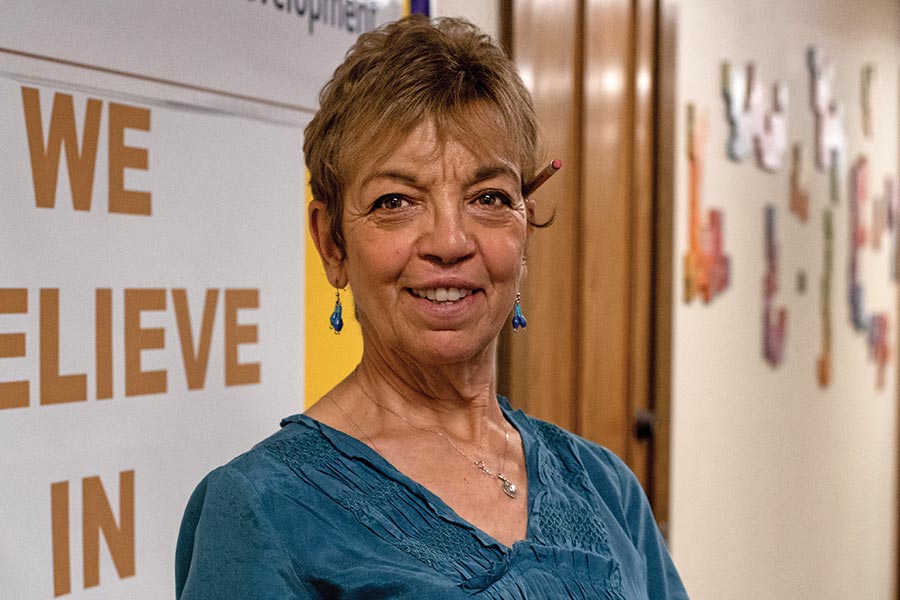THEIR LIFE'S WORK
Community in Action
Sharing power is key to advancing equality, says Marie Watkins, Ph.D.
by Sally Parker

As a child growing up in the cultural melting pot of Niagara Falls, New York, in the 1950s and ’60s, Marie Watkins ’73, Ph.D., witnessed community in action.
Along with the smells of Sunday sauce, shish kebabs, kielbasa, and barbeque in the air, the professor of community youth development at Nazareth remembers, just as vividly, early lessons in discrimination, barriers, and empathy.
When she was 6 she was playing catch with a friend, and the ball sailed over the fence. A neighbor kept it and yelled at them, calling Watkins’ Black friend a word Watkins had never heard. She ran into the house to tell her mother.
“I’ll never forget my mother getting up, running to that lady’s house, and saying to her, ‘Give the kids their damn ball back, and don’t you ever, ever, ever use that word again in front of these kids.’”
Born with a bilateral cleft palate and lip, Watkins endured teasing from other children. While comforting her, her mother planted a seed of empathy: “Think about how they must not have parents to teach them better that they would make fun of you.”
Watkins’ early experiences steered her toward a path of building community. The first in her large extended family to go to college, she found her place applying academic theory to community-led partnerships.
She was an “underprepared and underachieving” community college transfer student when she arrived at Nazareth in 1971, she says, but the campus felt like home. Right away she found a safe haven in the intimate Sunday Mass led by Father William H. Shannon and Sister Barbara Staropoli.
A social work major, Watkins became a resident assistant and a dean’s list student who found her voice by modeling herself on the Sisters and other women on the faculty.
“I’m watching and listening to these incredibly self-assured women, and they had the academic and spiritual grounding to pronounce their truth and voice their convictions,” she recalls.
A long career with the Boys & Girls Clubs of America in Niagara Falls, Albany, Syracuse, and Indianapolis followed. Mentors encouraged her along the way — some remain friends 50 years later — and Watkins in turn has guided dozens of students. In 1986, she became the Clubs’ first woman nationally to be named Professional of the Year. She returned to Nazareth in 1999 for a teaching position in the social work program, armed with a Ph.D. in child and family studies from Syracuse University.
Watkins, known as a tireless mentor, built up the Center for Service Learning during 12 years at the helm. Working with community agencies, she spearheaded Nazareth’s minor in community youth development, soon adding a major at the urging of students and partners. Agency professionals guest lecture in classes and serve as adjuncts and internship mentors.
Students’ real-world learning gives shape to the social justice legacy of the Sisters of St. Joseph, according to Watkins.
“In the service learning experiences, students learn about the internal strengths and the emotional intelligence of who we work with and learn from. It is a sharing of power,” she says.
“That’s my life’s work: creating a safe space, encouraging belief in oneself, and advocating for diminishing structural inequalities and barriers. It’s sort of like my mother, running to Mrs. Cavanaugh’s house. It’s about walking alongside.”
Sally Parker is a Rochester-based freelance writer. Photo by Donovan Enriquez '20.
Jonathan Coyle ‘18, ‘19G, teen program director, one of three CYD graduates at Cameron Community Ministries in Rochester: “It really got me fired up,” he says of the first time he heard Watkins’ story. “She has such a passion and a history in this work.”
Tremain Harris ‘22G, program coordinator for the Mayor’s Youth Advisory Council, City of Rochester Department of Recreation and Youth Services, and Watkins’ graduate assistant: “We challenge each other and we have a trust where we can talk honestly. It’s almost like we can finish each other’s sentence.”
Braa Elkhidir ‘16, program director with Boys & Girls Clubs of Indianapolis: “She was able to see that potential I had for something that I wasn’t able to see. Now, I look back and I see that in myself.”
Faculty Spotlights
See more faculty who support and challenge students: Faculty Spotlights.